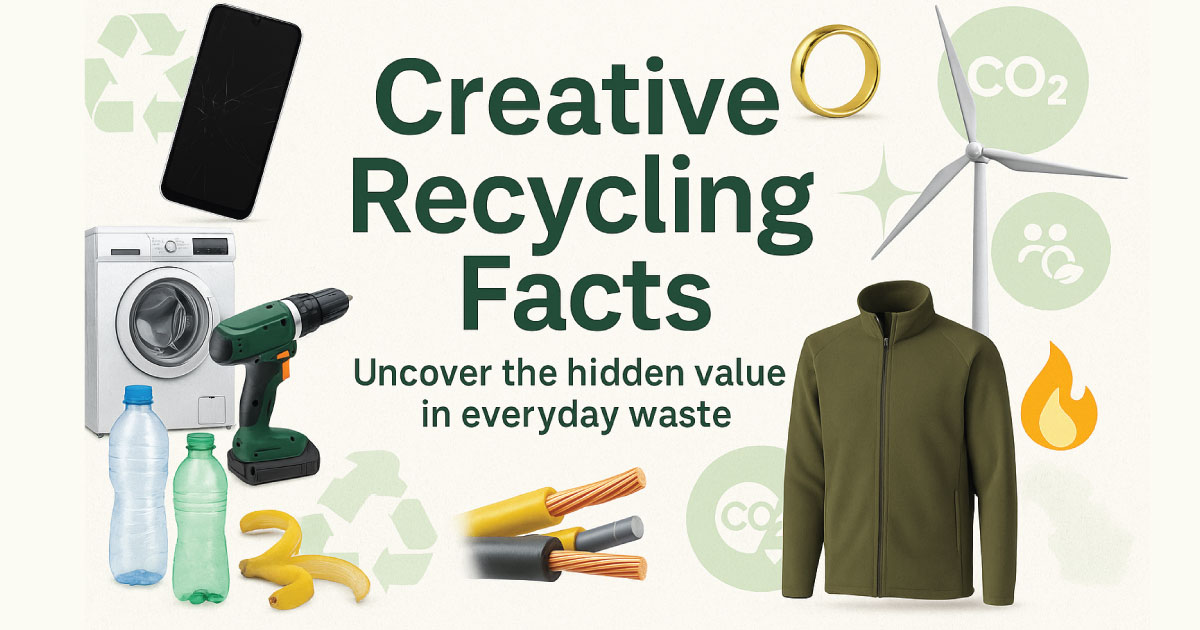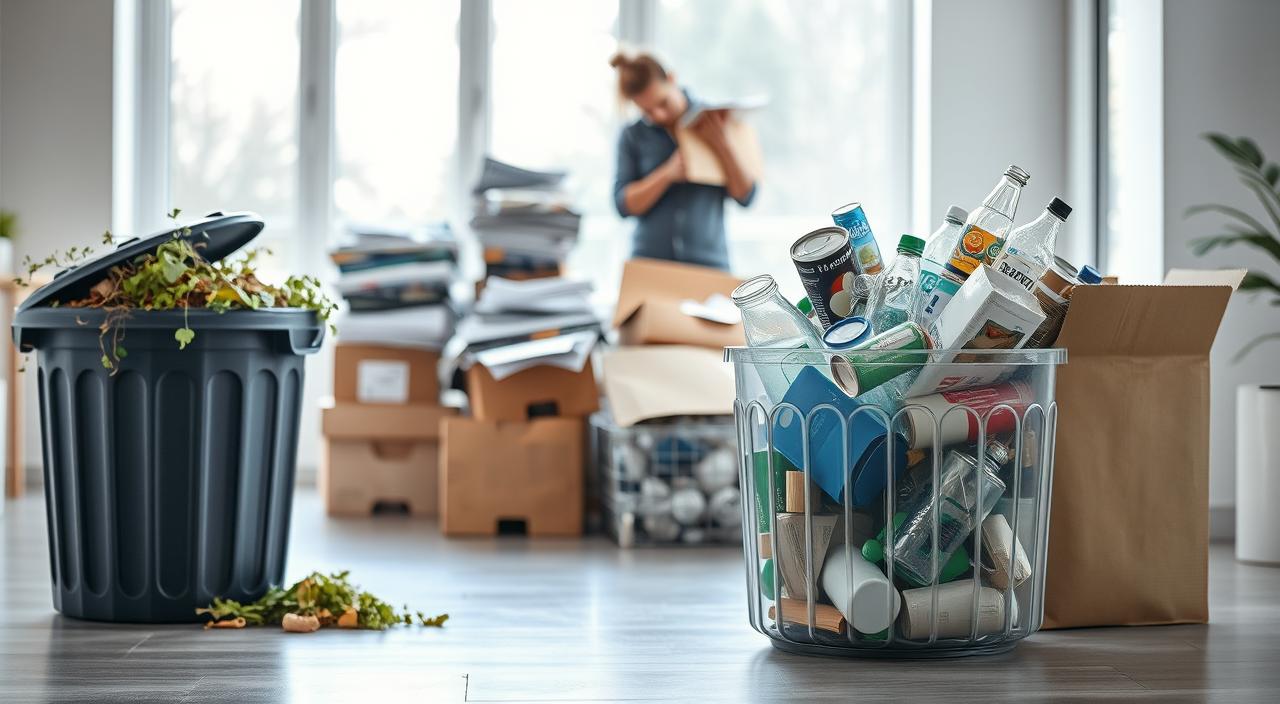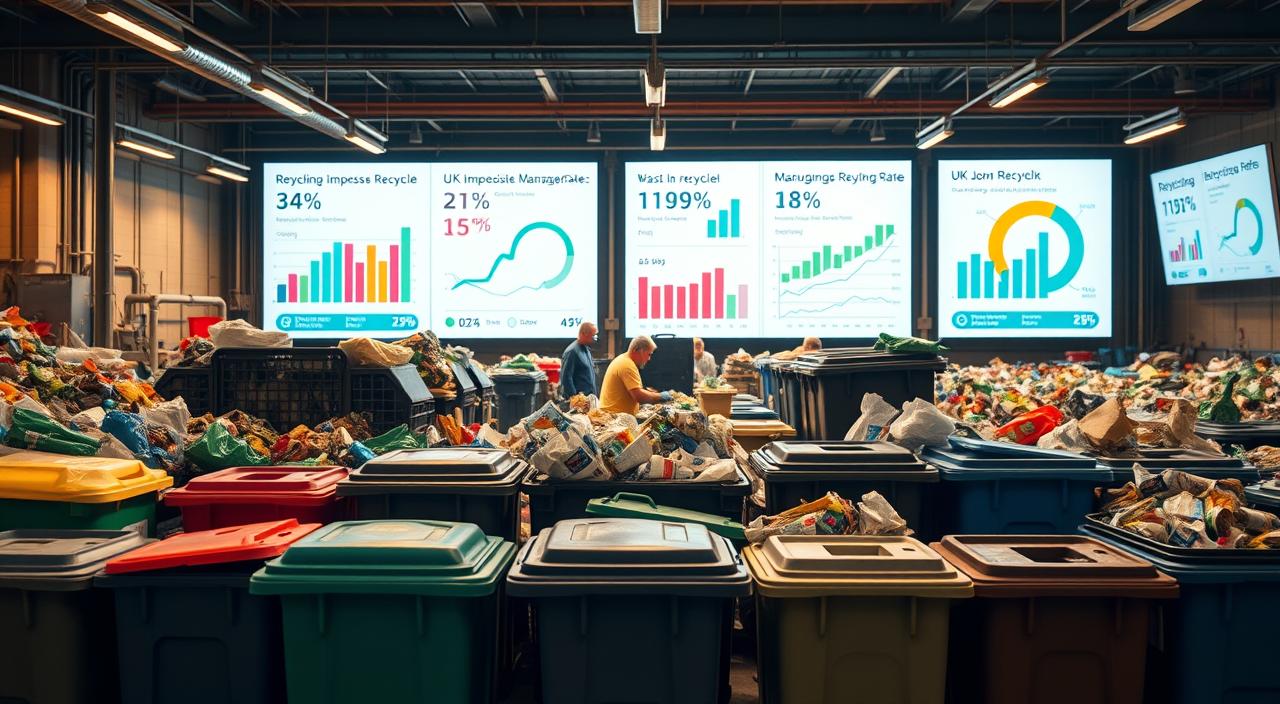
What if your broken blender could help build wind turbines? Or your old mobile phone contained enough gold to make jewellery? The truth is, many of the items we discard daily hold untapped value. From metals and plastics to food and paper, everyday waste can become powerful resources with the right disposal habits.

In fact, effective recycling already helps reduce 700 million tonnes of carbon dioxide emissions each year globally. Experts refer to waste recovery as the “Seventh Resource,” with potential to cut another billion tonnes of CO2 by 2030. By uncovering what lies within our household rubbish, we can support a cleaner planet and boost economic growth through innovative waste solutions.
Key Takeaways
- Everyday household waste contains valuable, reusable materials
- Proper recycling currently prevents 700 million tonnes of CO₂ annually
- Changing habits could remove an extra billion tonnes by 2030
- Electronics like phones house precious metals worth recovering
- Responsible disposal supports both sustainability and job creation
1. Your Drawers Hold Precious Metals
The average UK household has around £200 worth of unused electronics sitting in drawers. These include outdated mobile phones, tablets, and power tools—items rich in materials like copper, gold, and silver.
Example: A single mobile phone may contain enough precious metal to contribute to jewellery manufacturing. With over 55 million unused devices in UK homes, that’s enough gold to create 85,000 wedding rings.
| Item | Key Materials | Estimated UK Annual Waste Value |
|---|---|---|
| Mobile Phones | Gold, Silver, Palladium | £370 million |
| Washing Machines | Copper, Aluminium, Steel | £620 million |
| Power Tools | Tungsten, Cobalt, Nickel | £290 million |
2. Washing Machines Can Power Renewables
A discarded washing machine contains around 3kg of copper—enough to make 300 electrical wires. These copper coils are essential for renewable energy installations, from wind farms to electric vehicle batteries.
Recycling 95% of a washing machine’s components is now possible thanks to modern processing technologies. This helps close material loops and reduce pressure on raw mineral extraction.
3. Most Glass Is Infinitely Recyclable
Glass is one of the most recyclable materials on the planet. In the UK, 76.5% of glass bottles and jars re-enter production each year. Once collected, glass can be melted and reshaped in just 30 days—without any loss of quality.
This cycle can repeat endlessly, making glass a cornerstone of a sustainable packaging system. Always rinse and separate glass by colour where facilities allow.
4. The Plastic Bag Levy Changed Behaviour
Introduced in 2015, the UK’s 5p carrier bag charge led to dramatic results:
- 97.9% drop in supermarket bag distribution
- 42% reduction in marine plastic waste
- 89% of shoppers now use reusable cotton totes
This demonstrates how small legislative changes can produce huge environmental wins.
5. Myths About Recycling Quality Are False
Many believe that recycled goods are inferior. In reality, products like reprocessed glass use 40% less energy compared to virgin materials. Similarly, recycled plastic often becomes durable fleece clothing or components in construction.
Modern sorting plants use AI and infrared technology to process mixed waste with high accuracy. Plastics, for example, are separated into up to 12 types for efficient reprocessing.

6. Plastics Can Be Recycled with Minimal Energy
Reprocessing plastics takes significantly less energy than producing them from scratch:
| Process | Energy Used (MJ) | Lightbulb Equivalent |
|---|---|---|
| New Plastic Production | 8.4 | 23 hours |
| Plastic Recycling | 0.05 | 26 minutes |
Considering the UK uses 8 billion plastic bottles yearly, recycling alone could power every home in London for six weeks.
7. Junk Bunk’s WEEE Disposal Powers Green Tech
E-waste is a goldmine for metals. Services like WEEE disposal recover gold, copper, and rare earth metals from electronics.
Their certified centres process 12,000 tonnes of devices annually, diverting 98% from landfills. Reclaimed materials supply up to 40% of copper needed by UK renewable energy sectors.
8. Recycling Paper Protects Forests
Sorting one tonne of paper waste saves 17 mature trees—enough to provide oxygen for 34 people per year. If everyone in the UK recycled consistently, we could protect 390 million trees over the next decade.
Discover how office clearance supports this environmental effort across businesses.
9. Food Waste Holds Huge Potential
Each year, the UK wastes 9.5 million tonnes of edible food—enough to feed every Londoner for 11 years. Redirecting even 15% could provide meals for 2.5 million people in need.
Food waste recycling also generates biogas. For example, properly separated tea bags can power up to 7,000 homes.
10. Recycling Supports Green Jobs and the Economy
Waste management is a growing sector that drives local employment and economic gains:
| Process | Jobs per 10,000 Tonnes | Example Equivalent |
|---|---|---|
| Landfill | 3 | Birmingham’s waste volume |
| Material Recovery | 18 | Manchester retail workforce |
| Reprocessing | 26 | Bristol’s NHS staff |
Businesses shifting to circular models report 23% higher profits. Composting schemes alone have helped UK supermarkets save £140 million in packaging since 2020.
External link suggestion: Explore circular economy jobs through WRAP UK.
Conclusion: Small Actions, Big Impact
Behind everyday habits lies a global opportunity. The things we throw away—mobiles, plastics, power tools—are rich with potential to cut emissions, fuel green tech, and support economic growth.
By embracing responsible disposal and innovative recycling, we reduce landfill, save energy, and protect ecosystems. Every plastic bottle rinsed, every broken phone recycled, and every paper sorted moves us closer to climate goals.
Let’s stop viewing waste as an endpoint. Instead, see it as a beginning—an entry into a system where everything gets used again, better.

 CALL NOW
CALL NOW